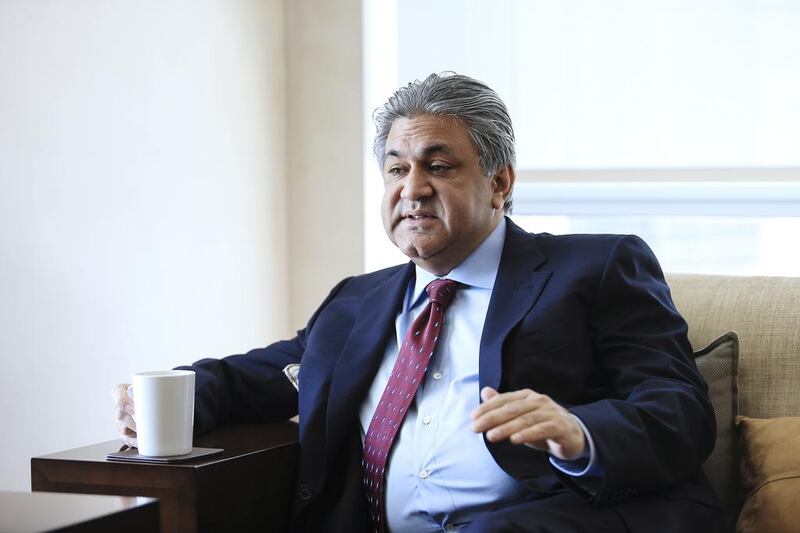A public prosecutor in the UAE has accepted a criminal complaint against Abraaj Group's founder Arif Naqvi for issuing a cheque without sufficient funds, in another blow to the embattled Dubai private equity firm.
A judge in Sharjah is scheduled on Thursday to rule on whether Mr Naqvi, who is in the UK but a Dubai resident, and his colleague Muhammad Lakhani issued the cheque without the necessary funds, according to a prosecution clerk and copies of court documents. The value of the claim is Dh177 million, the clerk said.
In an emailed statement to The National, a spokeswoman for Abraaj Group said: "Members of the media have inquired on a hearing and potential judgment to be issued in absentia on Thursday, 28 June, 2018 against Arif Naqvi.
"In relation to the media inquiries, Abraaj can confirm that a loan was granted and security provided in a pure commercial transaction. Partial repayment of the loan has been made and settlement discussions are ongoing with the intent to arrive at a satisfactory solution for all parties. It should be noted that the cheques were provided as part of a security package and as such should not have been submitted to a criminal court.
"Mr Naqvi is being represented in this matter by Habib Al Mulla, executive chairman, Baker McKenzie Habib Al Mulla," the spokeswoman added.
Abraaj said last week it agreed to sell a big chunk of its fund business to US investment management firm Colony Capital as a Cayman Islands court oversees the implementation of a restructuring plan for $1 billion in debts. The Grand Court of the Cayman Islands appointed Simon Conway of PwC Corporate Finance and Recovery (Cayman) and Michael Jervis and Mohammed Farzadi of PwC, as joint provisional liquidators.
"Abraaj is surprised by the excessive media interest which comes at a sensitive moment in its restructuring efforts and sale of the group’s regional fund business to Colony Capital," the spokeswoman said in the statement.
"We believe deliberate efforts are being taken to destabilise the positive developments that the group and its joint provisional liquidators have been working very hard to secure.
_______________
Read more:
Abraaj unit co-chiefs quit board of management investment business
Abraaj restructuring request approved by Cayman Islands court
_______________
"Members of the media have also referred to the Auctus Fund. To Abraaj’s knowledge, Auctus is now the assignee of the said loan. In the view of our legal counsel, this raises questions of unjust enrichment and the overall basis and merits of the lawsuit," she said.
Auctus, a debt fund, now holds a $100m loan made to Abraaj by Hamid Jafar, founder of Sharjah's Crescent Group. Auctus has said it is unrelated to the Jafar family, the FT reported.
The hearing is a further twist in the unravelling of Abraaj, which says it has returned $6.5bn to investors over 16 years, but has been reeling for months over investor complaints that it mishandled their funds.
The bounced cheque was used as partial security for loans estimated at $300m made to Abraaj by Mr Jafar, a source told the Financial Times.
Mr Al Mulla, denied the allegations.
"The loan was given and the cheques were issued in a genuine commercial transaction and should be dealt with in a commercial manner," he told the FT. "Offers for payment and adequate securities were provided."
Mr Naqvi would not attend the hearing and had admitted that the cheque had not cleared, Mr Al Mulla said, according to the FT.
Mr Lakhani, a managing director at Abraaj, was not available for comment.
In the petition to wind up Abraaj in the Cayman Islands this month, the fund said two security cheques issued by Abraaj and dated February 28 were "dishonoured" on presentation on May 3, according to the FT.
Essam Tamimi, who is representing Mr Jafar, said in a statement to The National: "The issue is now a matter for the public prosecutor – the accused has signed cheques it is now clear he had no intention of honouring and is refusing to appear to face these criminal charges in the UAE ... The criminal complaint was submitted on behalf of the beneficiary of the bounced cheque in accordance with the relevant judicial procedures. The cheques were not a guarantee and were part of documentation which confirms the accused's liability to repay the debt on the due date of the cheques.
"As a matter of UAE Law cheques by definition are due on the date the cheque bears. I can also confirm there are no ongoing negotiations to resolve this matter.”







